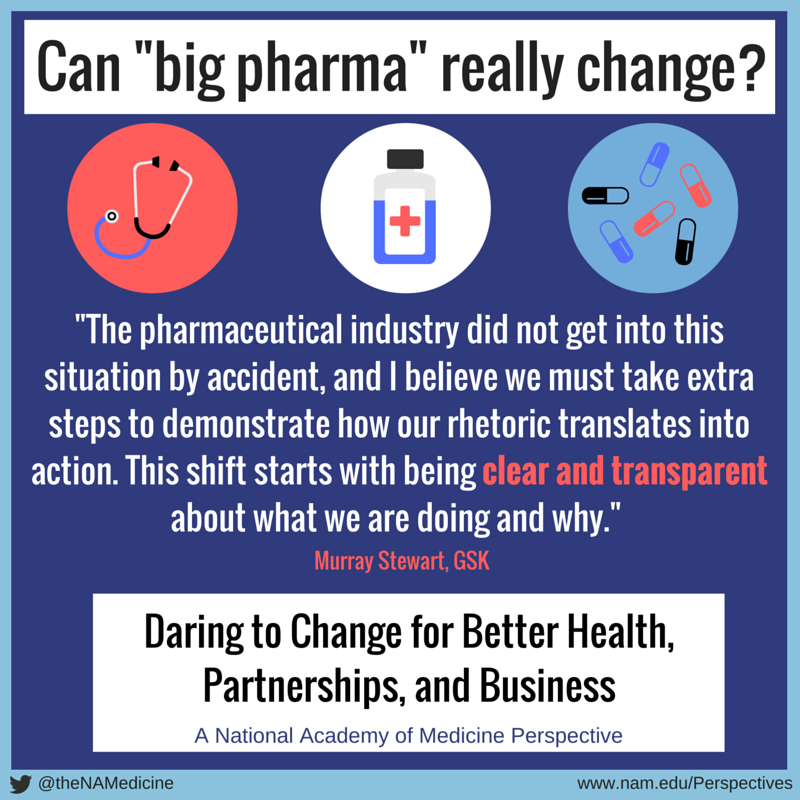Daring to Change for Better Health, Partnerships, and Business
Now in its third year of data disclosure, the Physician Payments Sunshine Act has helped demystify financial connections between two critically linked health sector stakeholders: health care providers and pharmaceutical companies. This week, the 2015 figures will be released and, with them, increased scrutiny of the nature of interactions between physicians and pharmaceutical companies. While this partnership is critically important—consider the fact that new medicines and vaccines would be impossible without collaboration between doctors and industry—it is often met with skepticism. And I believe a deeper mistrust of the pharmaceutical sector is a root cause of this unease.
An uncomfortable irony for those of us working in pharmaceutical companies today is that we are dedicated to helping people, and yet increasingly are unable to defend ourselves against accusations that our industry does the opposite. The toughest questions we face are not over why we are not curing cancer faster or whether one approach to treating diabetes might be more effective than another—but about trust.
Without public trust, everything we do has the potential to be viewed in a suspicious and negative manner. The pharmaceutical sector is the poster child of this dynamic, with the timeliest illustration found in the debate over the cost of medicines, but it permeates even our altruistic attempts to engage in community partnerships or disaster relief. The suspicion is so high that people look for ulterior motives rather than accept that we are trying to make a difference in communities and in patients’ lives.
Great advances in science and drug development are leading us to medicines of true value, with the potential to cure some diseases and give patients full and healthy lives again. Our challenge is to break the cycle of mistrust so that our pioneering work can fully reach patients in need, and we can once again be recognized as credible health partners. The pharmaceutical industry did not get into this situation by accident, and I believe that we not only must take accountability, but must take extra steps to demonstrate how our rhetoric translates into action. This shift starts with being clear and transparent about what we are doing and why.
GSK is not without its past indiscretions, but one trait the company models is a willingness to plunge into new waters for the sake of our credibility. In recent years, we have overhauled two historically-rooted key industry practice —the first pharmaceutical company in the world to make these changes. First, we recently changed the traditional structure of our commercial relationships. For the past five years in the United States, and the past year and a half globally, we have stopped providing our sales representatives incentives based on the number of prescriptions generated.
Second, as of this year, we stopped paying external health care providers to speak on behalf of the company about our prescription medicines. While it is a legal practice, the ethical concerns that it raised were not in the best interest of the company or our relationships with customers and patients.
Changing practices which have been long embedded across an organization, and, indeed, across an industry, is a challenging proposition and growing pains were inevitable. Many commentators have questioned our approach, and much has been written about whether it will be workable when faced with traditional commercial realities. In fact, we are seeing evidence of positive commercial impact. For example, last year ViiV Healthcare (formed through a partnership between GSK and Pfizer) launched two innovative HIV therapies with great success in the United States, surpassing launches of other recent HIV treatments and allowing these two regimens to reach the #1 position in a dynamic patient market share.
We have not lost sight of our goal: to ensure we are making the right decision for patients—which we believe is inseparable from the right decision for our business. This goal drives intelligent, tough conversations with our employees about what value really means to customers, what customers really need in a world where they are under pressure, and how to help a customer or a doctor make a better, more appropriate decision. We have confidence in our medicines, but we only want them used when they are the right drug for the right patient.
Other aspects of change we have been undergoing have been easier. Everyone is stretched for time, most especially our health care providers, and convenience is the name of the game. Now, when health care professionals need information on our medicines, they can go online and have a direct interaction with a highly qualified GSK physician who can give them the information they need 100 percent within the framework of the Physician Payments Sunshine Act.
We have about 1,000 physicians globally at GSK and employ an increasing number of specialist medical experts in the United States and other countries who work directly with health care providers across therapeutic areas to provide detailed information and support the appropriate use of our medicines.
More than 16,000 providers across 20 countries recently logged into a webinar as part of this program, providing evidence that our approach to being clear and transparent is working. Whether it is when a doctor needs us or transforming how our sales representatives work, this approach is successful when we think about how to be there for those who look to us for information.
I believe that being clear about what we are doing and why leads to and supports trust. Being nimble and embracing progress is also the universal key to survival and, I believe, at the heart of a prosperous business. So, we must continue to dare ourselves to change for the better.
Download the graphic below and share it on social media!

